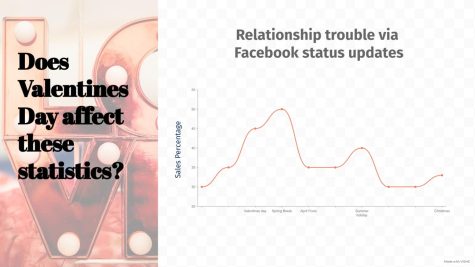The perniciousness of Valentine’s Day
Across the world, people celebrate the most hated holiday: Valentine’s Day. Although some celebrate true love and the people around them on Valentine’s Day, there lie several cons to the love-based celebration.
February 14, 2023
Valentine’s Day: the day couples share their love through a rose petal surprise, Ghirardelli chocolates and love letters probably copied off of Google. With 365 days in a year, people feel the need to spoil their partner on only one of them, while the rest of the 364 days remain unnoticed. There, within the sheer amount of performativity of Valentine’s, lies multiple controversial issues with the holiday itself.
Valentine’s Day originated from the Roman festival Lupercalia, a festival to celebrate the coming of Spring by auctioning women to men through a lottery system. At the end of the 5th century, the bishop of Rome—Pope Gelasius— replaced Lupercalia with St. Valentine’s Day; it took Lupercalia’s idea of ‘romance’ and channeled it into Valentine’s Day, named after the patron Saint Valentine.
Even though the day resembles love, it only benefits romantic relationships, leaving out single people. About 47.3% of the adult population in the US in 2016 identify as single (divorced, widowed, separated, or never married), adding up to around 115.78 million people. Single people deserve a day to receive flowers just as hitched people do; a silly holiday should not let them feel less worthy.
People should expect to spend an average of $161.96 on Valentine’s Day for their significant others, children, parents, friends and coworkers. Additionally, men will likely spend an exceeding amount of money. The survey found men plan on spending $229.54, while women plan to spend $97.77. People should not sacrifice their finances to impress their significant other.
“People stress trying to pay for Valentine’s gifts. They pick up extra shifts just for their significant other. Most of the time, partners aren’t even appreciative of what they receive and wish they got more luxury gifts,” junior Itoro Okpok said.
As pictures of happy couples flood social media pages on Valentine’s Day, people start to question their relationships. They may start to wonder how their relationship compares to these seemingly picture-perfect ones. This mentality, however, can mislead people. Marie Hartwell-Walker, Ed.D. confronted this issue for PsychCentral, expressing that people should not compare themselves with what they assume will happen. Because they never know what’s happening in someone else’s relationship, people easily idealize what they see on social media and end up feeling down about their relationship.
High expectations flourish around Valentine’s Day for couples, from the perfect gifts and the fanciest dinner to the notion of everlasting love and romance. All that pressure on relationships during Valentine’s Day can harm relationships, even leading to breakups. A study tracking Facebook breakup statuses found that couples tend to break up particularly after Valentine’s Day. High expectations set people up for disappointment, especially those expectations set for one single day. Thinking about Valentine’s Day as this special day reserved for showing love can also take away from daily practices of love and appreciation.

“I just don’t understand why a person deserves one day out of the year to be appreciated by their significant other. I think it’s cute to give gifts but it’s kind of weird when couples only express their love for Valentine’s day. This concept has been so normalized by couples that they don’t even realize,” Okpok said.




